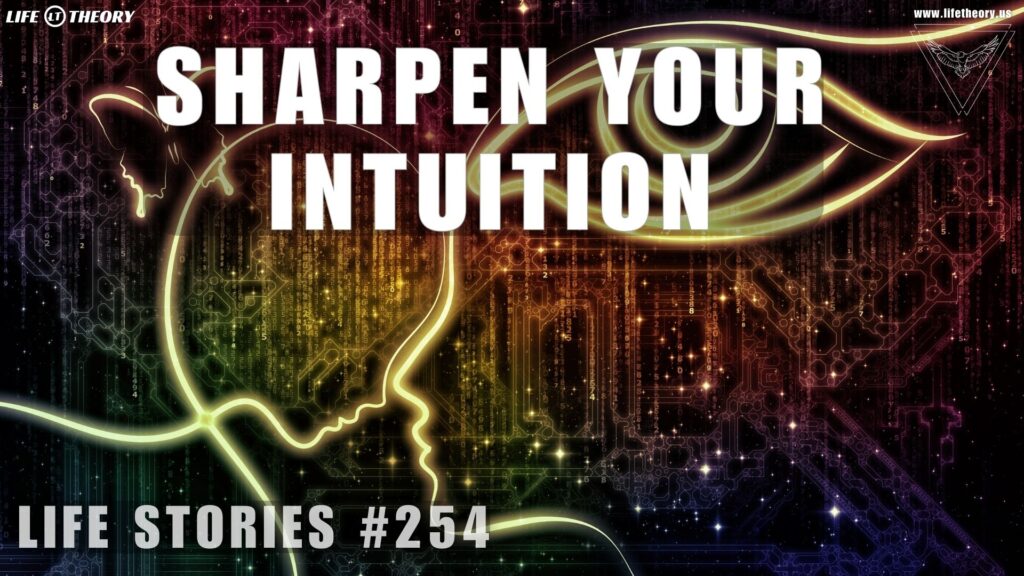Don’t Want To Read?
Watch/Listen To The Full Video on YouTube
We all have intuition, but few of us know how to trust it. That gut feeling you get? It’s not magic—it’s your brain recognizing patterns from past experiences, even if you’re unaware of them. Nobel laureate Herbert Simon explained intuition as “recognition”—our subconscious processing vast amounts of information faster than our conscious mind. But intuition isn’t always accurate; it needs to be refined. By reflecting on our decisions, learning from mistakes, and giving our minds space to process information, we can develop sharper instincts. The next time you feel that inner nudge, don’t ignore it—listen, evaluate, and let it guide you.
SUBSCRIBE: https://www.youtube.com/@LifeTheory46
Sharpen Your Intuition – Life Stories 254
Today, we’re diving straight into something we all have but often overlook—our intuition. You’ve felt it before, haven’t you? That quiet nudge in a certain direction, even when you can’t quite explain why. But what exactly is intuition? Is it some mystical force guiding us, or is it something grounded in our own experiences?
Let’s start with a familiar scenario: you’re walking down the street at dusk, heading home. You usually take the same shortcut. It saves a few minutes, it’s more scenic, and it’s become routine. But today, as you approach the shortcut, something stops you. A flicker of hesitation. Instead of taking the usual path, you decide to take a longer route. You don’t know why, but the idea of passing by that vintage store sounds appealing. So you follow that instinct and before you know it, you’re walking a path you haven’t taken in months.
Fast forward a few days, and you hear that someone was mugged in that same alley at the time you usually pass through. The victim is shaken but okay. You wonder—what stopped you from taking that path? What guided you to choose differently that day? Was it just chance, or was something else at play?
Many would call it intuition—that ability to know something without conscious reasoning. Some might dismiss it as coincidence, but intuition isn’t as mysterious as it seems. Nobel laureate Herbert Simon, an expert in decision-making and rationality, explained it as “recognition.” According to Simon, intuition is simply the brain drawing on years of experience stored in our subconscious. It’s the mind recognizing patterns we’ve encountered before, even if we aren’t aware of them.
Think of it this way: a grandmaster chess player can predict moves far in advance because they’ve stored thousands of patterns from past games. They might not have seen the exact scenario before, but their brain picks up on familiar sequences. It’s as if their intuition is on autopilot, processing information faster than they can consciously think through it.
But how much can we really trust our intuition? If you get a gut feeling that someone is lying, should you believe it? Or is your mind playing tricks? Our brains process an incredible amount of information every day—far more than we can consciously handle. Sorting through all that data would be impossible, so we rely on our subconscious to make those snap decisions.
Here’s the trick, though: intuition isn’t infallible. While our brains are good at recognizing patterns, they’re also prone to error. That doesn’t mean you should dismiss your gut feelings. It just means you need to hone your intuition—learn to recognize when it’s guiding you accurately and when it might be misleading you.
Throughout history, people have relied on intuition, sometimes without realizing it. Ancient cultures used practices like divination to guide their decisions when logic couldn’t provide answers. They believed these rituals helped them tap into deeper levels of understanding. Today, while we may dismiss those methods, they were simply tools for accessing knowledge beyond immediate comprehension.
Modern psychology tells us that we’re constantly influenced by subconscious cues. Thin slicing, a concept coined by psychologists Nalina Ambari and Robert Rosenthal, describes our ability to make accurate judgments based on just a small slice of information. They found that people could watch a 10-second silent clip of a teacher and accurately predict their effectiveness, simply by observing body language and non-verbal cues.
So, how do you sharpen this skill and trust your intuition without letting it mislead you? First, recognize that your brain is always processing information, even when you’re not aware of it. When faced with a decision, step away and let your subconscious work through the details. It’s often better at sifting through the noise than your conscious mind.
Second, learn from your mistakes. Your intuition won’t always be right, but instead of ignoring it when it fails, ask yourself why. Did you misread the situation? The more you reflect on these moments, the better you’ll become at sharpening your intuitive instincts.
And finally, trust yourself. Intuition is a powerful tool, but like any tool, it needs to be used wisely. If you feel something in your gut—like that hesitation before taking the shortcut—don’t dismiss it. Your brain might be picking up on subtle cues you didn’t consciously notice, trying to steer you in the right direction.
So, next time you get that quiet nudge—that feeling pulling you toward a certain choice—listen. Don’t blindly follow it, but don’t ignore it either. Give your mind the space to work through the information and trust that it might just be guiding you to the right decision, even when you can’t explain why.
–> Read More Life Stories Here:
https://www.lifetheory.us
https://www.lifetheory.eu
Buy all of our Life Stories & Our Premium Learning Packs. Listen or Read to them anytime you want. Have them Forever.
You can get each monthly lesson on our website at https://www.skyboy46.com/store
SHARE THIS STORY
Visit Our Store
SHOP NOW
www.skyboy46.com & www.myskypet.com
Designed For Pet Lovers & Introverted Souls
Sport, Hobbies, Motivation, Music & Art






~EXPLORE MORE~
www.linktr.ee/skyboy46



